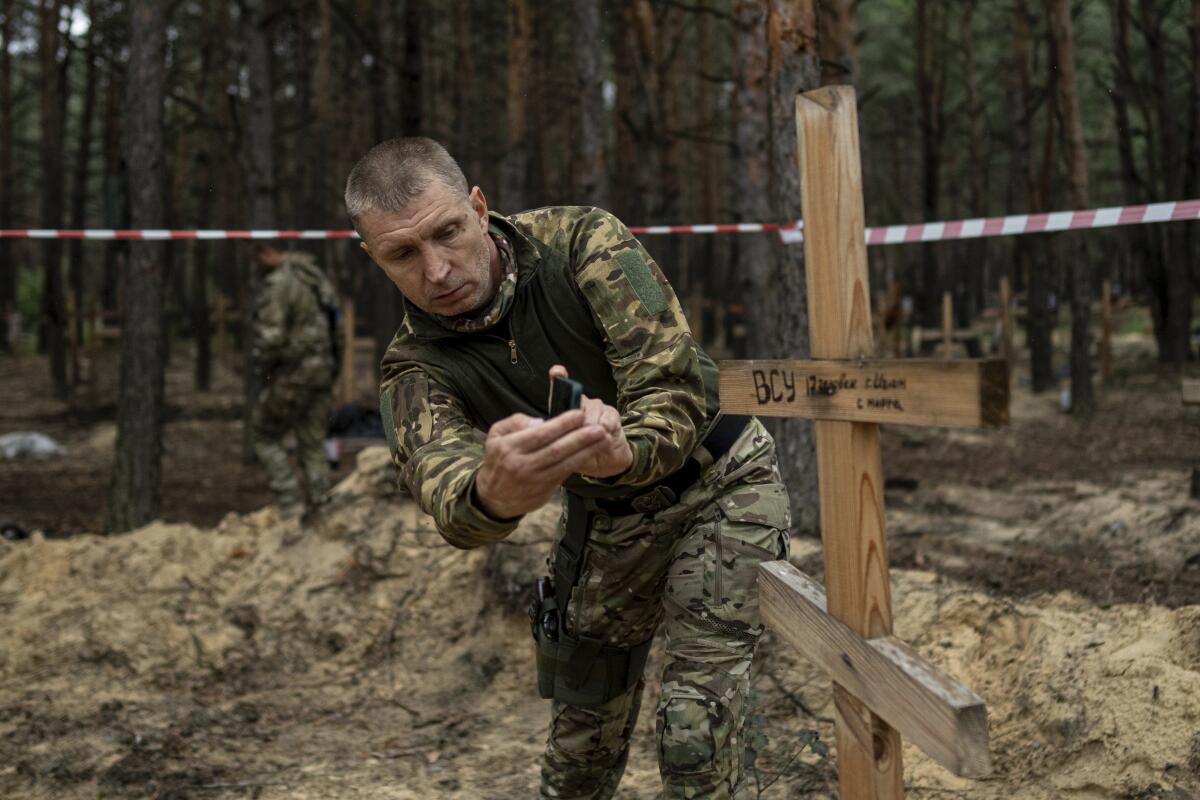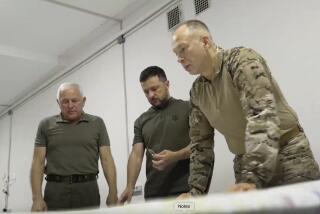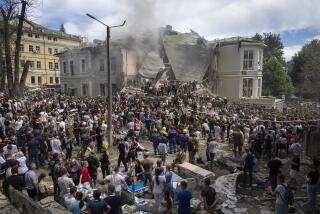Mass grave found near recaptured Ukrainian city

IZYUM, Ukraine — Ukrainian authorities found a mass burial site near a recaptured northeastern city previously occupied by Russian forces, President Volodymyr Zelensky announced Thursday night.
The grave was discovered close to Izyum in the Kharkiv region.
“The necessary procedures have already begun there. More information — clear, verifiable information — should be available tomorrow,” Zelensky said in his nightly televised address.
Associated Press journalists saw the site Thursday in a forest outside Izyum. Amid the trees were hundreds of graves with simple wooden crosses, most of them marked only with numbers. A larger grave bore a marker saying it contained the bodies of 17 Ukrainian soldiers.
Investigators with metal detectors were scanning the site for any hidden explosives.
Oleg Kotenko, an official with the Ukrainian ministry tasked with reintegrating occupied territories, said videos that Russian soldiers posted on social media indicated there were probably more than 17 bodies in the grave.
“We haven’t counted them yet, but I think there are more than 25 or even 30,” he said.
Izyum resident Sergei Gorodko said that among the hundreds buried in individual graves were dozens of adults and children killed in a Russian airstrike on an apartment building.
He said he pulled some of them out of the rubble “with my own hands.”
Zelensky invoked the names of other Ukrainian cities where authorities said retreating Russian troops left behind mass graves of civilians and evidence of possible war crimes.
“ Bucha, Mariupol, now, unfortunately, Izyum. … Russia leaves death everywhere. And it must be held accountable for it. The world must bring Russia to real responsibility for this war,” he said in the address.
Sergei Bolvinov, a senior investigator for Ukrainian police in the eastern Kharkiv region, told British TV broadcaster Sky News that a pit containing more than 440 bodies was discovered near Izyum after Kyiv’s forces swept in. He described the grave as “one of the largest burial sites in any one liberated city.”
Some of the people buried in the pit were shot. Others died from artillery fire, mines or airstrikes. Many of the bodies have not been identified yet, Bolvinov said.
Russian forces left Izyum and other parts of the Kharkiv region last week amid a stunning Ukrainian counteroffensive. On Wednesday, Zelensky made a rare trip outside the capital to watch the national flag being raised over Izyum’s city hall.
Deputy Interior Minister Yevhen Enin said Thursday night that other evidence found after Kyiv’s sweeping advance into the Kharkiv region included multiple “torture chambers” where both Ukrainian citizens and foreigners were detained “in completely inhuman conditions.”
“We have already come across the exhumation of individual bodies, not only with traces of a violent death, but also of torture — cut-off ears, etc. This is just the beginning,” Enin said in an interview with Ukraine’s Radio NV.
He claimed that among those held at one of the sites were students from an unspecified Asian country who were captured at a Russian checkpoint as they tried to leave for Ukrainian-controlled territory.
Enin did not specify where the students were held, although he named the small cities of Balakliya and Volchansk as two locations where torture chambers were found. His account could not be independently verified.
“All these traces of war crimes are now carefully documented by us. And we know from the experience of Bucha that the worst crimes can only be exposed over time,” Enin said, in a reference to a Kyiv suburb where the bodies of hundreds of civilians were discovered following the Russian army’s withdrawal from the area in March.
Earlier Thursday, Zelensky said that during the five months the Russians occupied the region, they “only destroyed, only deprived, only took away.”
“They left behind devastated villages; in some of them there is not a single undamaged house. The occupiers turned schools into garbage dumps and churches — shattered, literally turned into toilets.”
In other developments Thursday, Zelensky worked to add political momentum to Ukraine’s recent military gains, while missile strikes that caused flooding near his hometown demonstrated Moscow’s determination to reclaim the battlefield advantage.
A week after the Ukrainian counteroffensive, Zelensky met with European Union chief Ursula von der Leyen during her third wartime visit to Kyiv. Von der Leyen publicly conveyed the wholehearted support of the 27-nation bloc and wore an outfit in Ukraine’s national colors.
“It’s absolutely vital and necessary to support Ukraine with the military equipment they need to defend themselves. And they have proven that they are able to do this, if they are well-equipped,” she said.
Air raid sirens blared twice in Kyiv during von der Leyen’s meeting with Zelensky, a reminder that Russia has long-range weapons that can reach any location in Ukraine even though the capital has been spared attacks in recent weeks.
Ukrainian officials said Russian missiles late Wednesday struck a reservoir dam near Kryvyi Rih, Zelensky’s birthplace and the largest city in central Ukraine. The strikes flooded over 100 homes.
Russian military bloggers said the attack was intended to flood areas downstream where Ukrainian forces made inroads as part of their counteroffensive.
The head of the local government on Thursday reported a new attack on the dam and said emergency crews were working to prevent more water from escaping.
The first attack so close to his roots angered Zelensky, who said the strikes had no military value.
“In fact, hitting hundreds of thousands of ordinary civilians is another reason why Russia will lose,” he said.
Hanna Arhirova in Kyiv and Joanna Koslowska in London contributed reporting.
More to Read
Sign up for Essential California
The most important California stories and recommendations in your inbox every morning.
You may occasionally receive promotional content from the Los Angeles Times.










